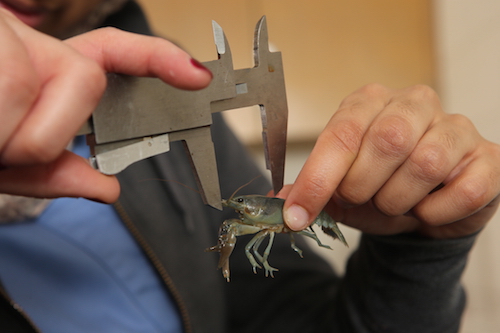Rachelle Belanger
Rachelle Belanger
Professor of Biology


Degrees
- Ph.D. in Biological Sciences, Bowling Green State University
- M.Sc. in Biological Sciences, University of Windsor
- B.Sc. in Biological Sciences, University of Windsor
- Associates Degree in Veterinary Technology, St. Lawrence College
Biography
Associate Professor of Biology Rachelle Belanger teaches several classes in biology and conducts research in olfactory development and toxicology. See below for details.
Research Overview
Olfactory Development
Belanger's research is focused on how sexual development and steroid hormones modulate the olfactory system. Belanger has been working with Cyprinids (Danio rerio, Epalzeorhynchus bicolor, Barbonymus schwanenfeldii, Carassius auratus) using electrophysiological, imaging, molecular and behavioral analysis techniques. These methods have allowed Belanger to demonstrate that treatment with aromatizable androgens (17α-methyltestosterone) increases both physiological electro-olfactogram response magnitude to putative pheromones and courtship behaviors in juvenile fish. Preliminary data and ongoing research suggests that these changes in physiology and behavior may be associated with proliferation of olfactory sensory neurons during development. Future research in her lab will examine changes in androgen receptor expression during androgen treatment and determine if a specific olfactory sensory neuron type is more prevalent during androgen treatment.
Toxicology Research
In Belanger's lab, they examine olfactory and behavioral effects of Atrazine and Metolachlor, two herbicides heavily applied to crops in the Great Lakes Basin. They use crayfish (Orconectes virilis) as a model organism for examining effects on olfaction. Crayfish are a keystone species, found in the aquatic food web and thus, changes in their population size could affect a broad range of species. Specifically, they are investigating whether Atrazine and/or Metolachlor application affects the animals' ability to locate odors sources, specifically reproductive odors and food odors. Preliminary data suggests that acute exposure to Atrazine and Metolachlor affects the ability of male crayfish to locate a female odor source and may also affect food odor detection as well. Future research in her lab will examine the concentration of Atrazine and Metolachlor found in the tissues of crayfish after an acute exposure and their effects on DNA repair mechanisms.
Publications
For a complete list of Belanger's publications, please see Google Scholar.



Teaching Experience
- General Biology I (BIO 1210)
- Principles of Human Anatomy and Physiology Lecture I (BIO 2300)
- Principles of Human Anatomy and Physiology Lecture II (BIO 2320)
- Animal Behavior (BIO 2840)
- Principles of Neurophysiology (BIO 3800)
- Physiology Laboratory (BIO 4640)
